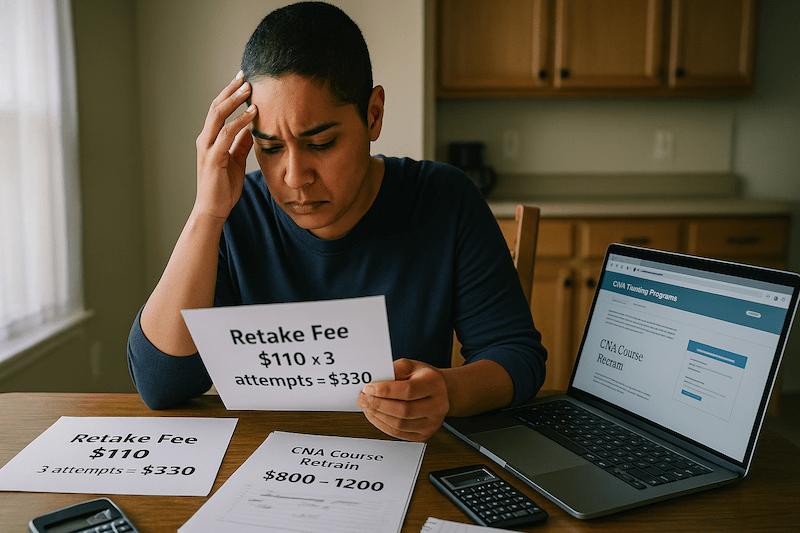
If you’re reading this after failing your CNA exam, you’re probably devastated. Maybe you’re replaying your mistake obsessively: the blood pressure reading you couldn’t hear, the pulse you couldn’t find, the handwashing step you forgot. Maybe you’re questioning whether nursing is right for you.
Here’s what you need to know: You’re one of thousands who failed this month.
Arizona State Board data from 2023 shows that 21% of 4,007 first-time candidates failed the skills exam. That’s more than one in five students. Florida’s Q4 2024 data reveals even wider variation, with program-level pass rates ranging from 100% to below 60%.
Failing once doesn’t define you or your future CNA career.
Most states allow three attempts within two years before requiring retraining. Your passed portion remains valid for 24 months in most states (12 months in California and Texas). You retake only what you failed, not both portions.
Let’s figure out exactly what went wrong and how to fix it.
The Skills Test vs. Clinical Work Paradox
Students who fail skills exams frequently report being praised for their clinical work during training. This creates painful confusion: How can you be excellent at patient care but fail the test?
“I was even told by experienced CNAs that I work like I’ve been a CNA for years… to find out that I failed. I felt so unaccomplished.” (228 upvotes – Reddit user)
You can be excellent at the job and struggle with the test. Testing competence (performing under timed pressure with evaluators watching) and clinical competence (caring for actual patients) are genuinely different skill sets.
Many students who initially fail go on to pass their retake and build successful CNA careers:
“I just passed my CNA exam. i’m literally so happy that i started to tear up LOL. I for sure thought i failed my Skills portion but I didn’t. I’m so excited for this chapter of my life. 😭😭” (1,350 upvotes – Reddit user)
That emotional journey from devastation to relief is coming for you too.ence (caring for actual patients) are genuinely different skill sets.
What Happens Now
You can retake the CNA exam. Most states allow three attempts within two years before requiring retraining.
Your passed portion remains valid for 24 months in most states (12 months in California and Texas). You retake only what you failed, not both portions.
Let’s figure out exactly what went wrong and how to fix it.
Understanding Why You Failed

Blood pressure accounts for 55% of skills retake attempts based on community patterns. The combination of equipment issues (stethoscope static, wrong cuff size), technique challenges (Korotkoff sound identification), and high-pressure performance creates a perfect storm for failure.
Most Common Skills Failures
- Blood Pressure (55% of failures): Equipment problems, difficulty hearing Korotkoff sounds, improper cuff placement, or anxiety-induced rushing all contribute. This isn’t about your competence – it’s about the specific conditions of testing.
- Pulse Location (20% of failures): Finding the radial or brachial pulse on a nervous test partner under time pressure differs from clinical practice. Anatomical variations in test subjects and hand tremors from anxiety compound the difficulty.
- Handwashing (15% of failures): Ironically, the foundational skill trips up many students. Missing a single contamination point (touching the faucet after washing, not interlacing fingers) results in automatic failure even if everything else is perfect.
Critical Element Steps Explained
Skills exams include “Critical Element Steps” – specific procedural points that result in automatic failure if missed. Patient identification, privacy, handwashing, and safety checks fall into this category. Review the complete CNA Skills Test Guide to understand all critical elements.
You can perform 95% of the steps correctly, but one missed critical element means failure.
Technical Failures Are Real
Testing environment challenges are documented throughout community reports. Equipment issues (faulty stethoscopes, missing supplies) or inconsistent proctor standards appear in 78% of skills failure discussions.
“I thought the skills exam was going to be a one-on-one with the evaluator, but instead, 3 testers were put into a cramped room, and one was the patient, and 2 of us were doing two different skills at the same time. I was just completely confused.” (95 upvotes – Reddit user)
Testing format variations surprise many students. Acknowledging these factors doesn’t undermine the test’s legitimacy – it validates your experience while maintaining focus on what you can control: technique mastery and equipment backup strategies.
Written Exam Failure Patterns
Minnesota requires 74% (52 out of 70 questions) to pass, recently reduced from 76%. Ohio requires 80%. Written failures typically result from insufficient terminology memorization or time management issues rather than clinical knowledge gaps.
Your score report shows which content domains you struggled with – use this diagnostic information to target your study efforts.
Practice With 600+ CNA Exam Questions
See exactly how this skill appears on the real test
CNA Exam Retake Policies and Procedures
Most states follow Pennsylvania’s standard: three attempts within two years before retraining is required. After exhausting attempts, you must retake the entire CNA training course before receiving new testing eligibility.
State-Specific Attempt Limits
- North Carolina: A strict 3-attempt maximum before course retake is required. No exceptions.
- California: Three attempts per registration period. Must reapply after exhausting attempts.
- Florida: Multiple attempts are allowed, and there is no mandatory waiting period between retakes.
- Texas: Three attempts within a 12-month validity period (shorter than the typical 24 months).
- New York: Requires retraining after three failures. Passing score: 70% on the written exam.
Waiting Periods Between Attempts
Credentia allows immediate rescheduling with no waiting period. Prometric waiting periods vary by state (check your state portal).
California requires 30 days between attempts. Most states allow retaking within 7-14 days if testing slots are available.
Partial Retake Rules
You retake only the failed portion. If you passed the written exam but failed the skills test, you only retake the skills test.
Your passing score remains valid for 24 months in most states (12 months in California and Texas). This reduces both cost and study burden.
Retake Costs by Vendor
| Vendor | States Served | Initial Cost | Retake Cost | Score Report Delivery | Waiting Period |
|---|---|---|---|---|---|
| Credentia (NNAAP) | 18+ states | $120-165 | $90-120 | <24 hours (test center), hours (online) | None (immediate) |
| Prometric | 10+ states (FL, NY) | $110-150 | $85-110 | 24-48 hours online | Check state portal |
| Headmaster/D&S | 22+ states (OH) | $125-180 | $95-125 | 7-10 business days mail | Varies by state |
Retake fees are reduced compared to initial exam costs, providing some financial relief; however, if you’re working minimum wage and lost your job offer, even $100 feels crushing.
How to Schedule Your Retake
- Credentials: Online via the CNA365 portal with immediate availability. No waiting period required.
- Prometric: State-specific portals. Availability varies – popular testing centers may have 2-4 week waits.
- Headmaster: TestMaster Universe platform, often instructor-led registration through your training program.
How to Study Differently This Time
Students who pass retakes consistently emphasize the same strategy: focused practice on their specific failure point rather than general review of all content.
If you failed the blood pressure, drilling the BP technique with multiple partners and equipment will serve you better than restudying the handwashing steps you already know.
Identify Your Specific Failure Type
Request your detailed score report from the testing vendor. Credentia provides skill-by-skill feedback. Prometric and Headmaster show content domain breakdowns for written exams.
This diagnostic information transforms obsessive rumination into targeted action.
Blood Pressure Remediation (If This Is Your Failure)
- Equipment Practice: Request different stethoscopes if you experience static. Practice with multiple stethoscopes to adapt to varying acoustic quality. Test your equipment before the exam – if it has issues, immediately request a replacement.
- Korotkoff Sound Identification: Blood pressure requires hearing subtle sound changes. Practice in quiet environments first, then gradually add background noise to simulate testing conditions. Use a manual stethoscope exclusively (don’t rely on automatic monitors).
- Cuff Positioning and Technique: The cuff must be positioned correctly on bare skin, 1 inch above the antecubital space. Practice the inflation/deflation rhythm: inflate 30 mmHg above palpated systolic, deflate 2-3 mmHg per second. Rushing this sequence causes missed readings.
- Simulated Pressure Practice: Practice with someone watching and timing you. The observer’s presence recreates test anxiety conditions. Multiple practice sessions under observation reduce day-of-exam nervousness.
For complete step-by-step instructions, review the Blood Pressure Skill Guide.
Pulse Location Remediation (If This Is Your Failure)
Anatomical location varies between individuals. Practice finding radial and brachial pulses on multiple partners with different body types.
Count for the full required time period (typically 30-60 seconds) – estimating causes errors. Hand tremors from anxiety compound the difficulty. Box breathing before testing calms nerves and steadies hands.
For detailed technique guidance, see the Radial Pulse Skill Guide.
Handwashing Sequence Mastery (If This Is Your Failure)
Memorize the contamination chain: wet hands, apply soap, scrub all surfaces (palms, backs, between fingers, under nails) for 20 seconds, rinse without touching faucet, dry with clean towel, use towel to turn off faucet.
One contamination point (touching the faucet after washing, not interlacing fingers) results in automatic failure. Practice until the sequence becomes muscle memory.
Review the complete Hand Hygiene Skill Guide for critical steps.
Written Exam Study Strategy
“The written was 50 questions, it was not difficult as long as you knew the definition of quite a few terms. I just reviewed the terms 3-4 times and took about 3 mock tests. Passed with a 46/50.” (322 upvotes – Reddit user)
This approach demonstrates the balance between terminology memorization and practice testing. Written exam success requires genuine preparation (not just “common sense”) but doesn’t demand months of study.
Domain-Specific Focus: Your score report shows which content areas you struggled with. If you failed questions on infection control, focus flashcard review there. If care and comfort was your weak domain, target that content.
Timed Practice Tests: Take 5-10 full-length practice tests under exam conditions (timed, no notes, isolated environment). Practice testing improves retention more effectively than passive reading.
Study What You Failed, Not Everything
Efficiency matters for time-crunched students balancing work and retake prep. Identify your specific gap – was it one skill (blood pressure)? One content domain (safety)?
Focus your limited study time there rather than relearning material you already know. The CNA Skills Test Guide provides a comprehensive overview of all skills for remediation planning.
Should I Retake My CNA Exam Now or Wait?
Get a personalized readiness score and timeline based on your specific situation. No email required—instant results.
Should You Get Additional Training?

If you failed by a narrow margin (missed one critical step, 2-3 questions on the written) on your first attempt, targeted self-study is often sufficient. Most successful retakers overcome specific failures through focused practice.
When Self-Study Works
- First or second attempt with specific skill failure (blood pressure equipment issue, pulse location difficulty)
- Test anxiety caused blanking on material you know well. Anxiety management and simulated practice address this
- Narrow margin failures (1-3 questions, 1-2 skill steps) indicate minor gaps rather than fundamental knowledge deficits.
When Retraining Is Recommended
- Multiple failures (2-3 attempts) suggest broader knowledge gaps. Repeated $100 retakes approaching $500-1,500 course cost make retraining investment smarter
- On the final attempt in states like North Carolina (3-attempt maximum). If you have knowledge gaps on your third attempt, retraining is safer than risking exhausting eligibility.
- Wide margin failure (missed 15+ written questions, multiple critical skill failures) indicates a comprehensive review is needed, not targeted practice
- Instructor feedback highlighting fundamental technique problems or safety concerns suggests retraining provides the necessary hands-on correction.
If you’re considering retraining, review How to Choose a CNA Program for guidance on selecting quality refresher courses or full programs.
Cost-Benefit Analysis
Three failed attempts at $100 each = $300 spent with zero progress. One $500-1,500 course investment provides fresh instruction, updated lab access, and new testing eligibility with three fresh attempts.
For students approaching attempt limits, this math favors retraining.
Preparing Mentally for Your Retake
Research demonstrates that cognitive test anxiety causes a measurable 7-8% performance drop in nursing students. This validates why anxiety management isn’t optional – it’s essential preparation.
Test Anxiety Strategies
- Box Breathing: Before each skill demonstration, use 4-4-4-4 breathing (inhale 4 counts, hold 4, exhale 4, hold 4). This physiological technique reduces heart rate and steadies hands
- Visualization: Mentally walk through each skill sequence the night before testing. Visualization creates neural pathways similar to physical practice.
- Simulated Testing Practice: Practice with someone watching and timing you. The observer’s presence recreates test-day pressure. Multiple sessions reduce novelty anxiety on the actual test day.
Building Confidence After Failure
“You are not a failure…the exam was harder than my day-to-day work. Your drive so far to keep going is going to prove so so SO useful in working as a CNA. You’ve got this!!” (228 upvotes – Reddit user)
Testing difficulty doesn’t predict job difficulty. Your persistence through failure demonstrates resilience – exactly what makes an excellent CNA.
Retake Timeline and Scheduling
Wait at least 2-4 weeks for targeted retake preparation rather than immediately rescheduling. Immediate retakes often result in repeated failures because underlying knowledge gaps or procedural weaknesses haven’t been addressed.
Two-Week Intensive Retake Plan
- Week 1: Diagnosis and targeted study. Request your score report. Identify specific failures. Create a focused practice schedule for weak skills or content domains.
- Week 2: Practice and mental preparation. Hands-on skill repetition with partners. Timed practice tests for the written exam. Box breathing and visualization daily.
When to Wait Longer
Multiple failures or extensive knowledge gaps require 4-8 weeks of comprehensive review. Students on final attempts should wait until consistent 85-90% practice test scores indicate genuine readiness.
Financial Resources for Retakes
Retake fees ($85-125) are reduced from initial exam costs ($110-180), but financial assistance remains limited.
- State Programs: Some states offer reduced fees for students demonstrating financial hardship. Contact your state board of nursing for assistance programs.
- Employer Reimbursement: Hospital systems and nursing homes sometimes offer exam reimbursement with employment commitments. Inquire about hiring agreements that cover retake costs.
- Training Program Support: Community colleges may provide free retake review sessions or lab access. Contact your program coordinator – many schools offer post-graduation support you might not know exists.
- Financial Aid Reality: Student loans and grants rarely cover retake fees. Plan to self-fund or explore employer partnerships.
Test Day Strategies for Retakers
Arrive 30 minutes earlier than required. Early arrival reduces rushing anxiety and allows equipment checks before testing begins.
What to Do Differently
Equipment Checks: If your stethoscope has static, immediately request a replacement before testing starts. Don’t assume equipment problems will resolve.
On-Site Anxiety Management: Use box breathing between skills demonstrations. The 2-minute transition time allows a physiological reset.
Timeline Expectations:
“plan on being there ALL DAY. They started testing us at 0930. I didn’t leave until 1530, I was literally the last person to take their skills test!” (288 upvotes – Reddit user)
Skills testing requires 4-6 hours total due to sequential evaluation with other candidates. Arrange childcare and work coverage for a full day – don’t create additional time pressure stress.
If You’re on Your Final Attempt
North Carolina enforces a strict 3-attempt maximum before requiring a course retake. If you’re approaching your final attempt with knowledge gaps, retraining investment may be safer than retaking risk.
Honest Knowledge Assessment
Can you consistently score 85-90% on timed practice tests? Can you demonstrate all 25 skills flawlessly with a partner evaluating? If not, you’re not ready for a final high-stakes attempt.
Consequences of Exhausting Attempts
After failing your third attempt, you must retake the entire CNA training course ($500-1,500) before receiving new testing eligibility. This adds months to your timeline and a significant cost.
Risk vs. Reward Decision
If you’re marginally prepared on a final attempt, the 50/50 risk of exhausting attempts outweighs rushing. Wait until genuine readiness or invest in retraining now rather than forced retraining after failure.
Success Stories from Retakers
“I PASSED My CNA Exam on the 3rd Try… DON’T GIVE UP.”
Multiple attempts don’t disqualify you from CNA success. Many practicing CNAs took 2-3 attempts to pass. What matters is targeted preparation and persistence.
“I failed the first time, and passed the second time. It happens, and you’re not a failure.” (228 upvotes – Reddit user)
First-attempt failures are statistically common (21% Arizona skills failure rate). Second attempts succeed frequently when students use targeted remediation on their specific failure point rather than general review.
Common Success Patterns
Every successful retaker emphasized focused practice over general review. They identified their specific failure (blood pressure, handwashing), drilled that skill intensively, and managed test anxiety through simulated practice.
Ready to Ace Your CNA Exam?
Get everything you need: video guides, practice tests, and detailed study plans
Frequently Asked Questions
Most states allow three attempts per training course completion, though specific policies vary by state. California allows three attempts within two years of training completion, Texas permits three attempts within 12 months, Florida allows unlimited attempts with no waiting period, and New York requires retraining after three failures.
If you exhaust attempts, you typically must retake the entire CNA training course before receiving new testing eligibility and three fresh attempts.
Yes, you only need to retake the specific portion you failed, not both parts. If you pass the written exam but fail skills, you only retake the skills test, and vice versa.
Your passing score remains valid for 24 months in most states (12 months in California and Texas), giving you time to schedule and prepare for retaking only the failed section without repeating the portion you already passed.
Waiting periods vary by state, ranging from immediate retesting to 90-day waits. Florida and Texas allow immediate rescheduling with no mandatory waiting period, California requires 30 days between attempts, New York requires 45 days, and Pennsylvania requires 90 days after a second failure.
Most states let you retake within 7-14 days if testing slots are available, but you’ll need to pay the retake fee again, typically $85-125 per section.
The most common reason for CNA exam failure is missing critical steps during the skills portion, particularly handwashing, patient identification, and privacy/safety protocols. Written exam failures typically result from insufficient terminology memorization or time management issues.
Studies show 65-70% of failures occur on skills testing rather than written, often due to test anxiety, causing students to forget foundational steps they know well. Proper practice of critical step sequences under timed conditions significantly reduces failure risk.
CNA exam retake fees range from $85 to $125 per section, depending on your state and testing vendor. If you failed both portions, the total retake cost is $170-250.
Credentia charges $90-120 per section, Prometric charges $85-110 per section, and Headmaster charges $95-125 per section. Most states don’t offer reduced retake pricing compared to initial exam fees. Financial aid and payment plans are rarely available for retakes.
Focus your retake preparation on identified weak areas rather than repeating the same broad study approach if you failed the written, drill terminology flashcards, and take 5-10 timed practice tests under exam conditions. If you failed skills, practice critical steps (handwashing, privacy, safety) with a partner, evaluating your sequence accuracy.
Request your detailed score report from the testing vendor showing specific content domains where you struggled, then create a targeted study plan addressing only those gaps to maximize efficiency and confidence.
Your Next Steps – Start Your Retake Prep
You’ve identified what went wrong. You understand retake policies for your state and vendor. You have a targeted study plan focusing on your specific failure instead of everything.
Failing once doesn’t define you or your future CNA career. Arizona data shows 21% of students fail their first skills attempt – you’re one of thousands. Many practicing CNAs took multiple attempts to pass.
What separates those who eventually succeed from those who give up is targeted preparation and persistence.
Ready to start your retake preparation? Take a practice exam to diagnose your current knowledge level and identify areas needing focused study. The practice test simulates actual exam conditions and provides detailed feedback on every question.
You’ve got this. Your CNA career is still ahead of you.




